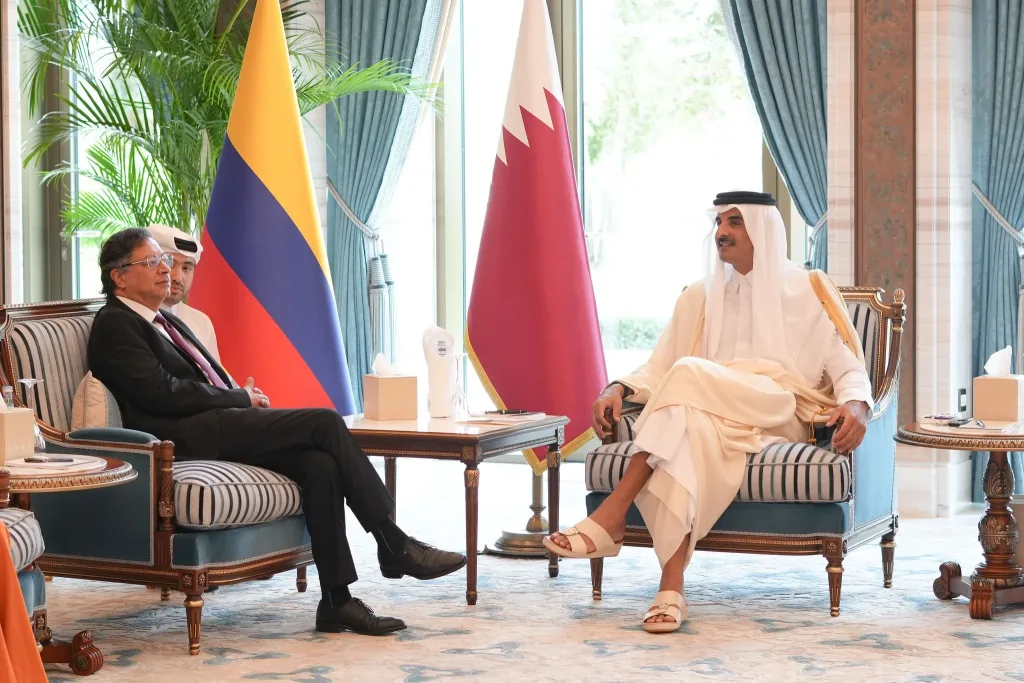
Colombian President Gustavo Petro meets the Emir of Qatar, Tamim bin Hamad Al Thani, in Doha on Monday, Nov. 3, 2025. Photo: Colombia's Presidential Office.

Orinoco Tribune – News and opinion pieces about Venezuela and beyond
From Venezuela and made by Venezuelan Chavistas

Colombian President Gustavo Petro meets the Emir of Qatar, Tamim bin Hamad Al Thani, in Doha on Monday, Nov. 3, 2025. Photo: Colombia's Presidential Office.
Caracas (OrinocoTribune.com)—On Sunday, the Colombian government announced that it will ship 240 tons of humanitarian aid to Cuba in response to the damage caused by Hurricane Melissa, which severely affected the eastern part of the island on Oct. 29, leaving many people without homes or provisions.
The ARC Victoria was scheduled to depart from Cartagena de Indias, Colombia, on Monday, bound for Cuba, where it is expected to arrive on Thursday. The cargo includes food kits, hygiene products, mosquito nets, UHT milk, drinking water, and fuel, noted Carlos Carrillo, director of Colombia’s National Unit for Disaster Risk Management (UNGRD).
The operation, which has the support of the mining, energy, and agricultural sectors, is part of a joint effort between several state entities. Out of the 240 tons, 54 tons are dry goods intended to cover immediate needs in the most severely afflicted areas.
Solidaridad al Caribe: más de 50 toneladas a Jamaica y Cuba. La solidaridad debe ser permanente con Haití..no mandamos misiles, mandamos comida y vida. https://t.co/EbCWhYyzyo
— Gustavo Petro (@petrogustavo) November 2, 2025
UNGRD reported that “the operation is coordinated by the UNGRD in conjunction with the Ministry of Foreign Affairs, Civil Defense, Aerospace Force, National Police, Colombian Navy supported by the Caribbean Naval Force, Ministry of Agriculture, Ministry of Mines and Energy, and Ecopetrol.”
On Monday, President Petro reposted a message by the UNGRD reporting that UHT milk had been loaded onto the ship in Cartagena and that it would soon depart for Cuba.
“Solidarity with Jamaica began, and now the Colombian navy is heading to Cuba carrying dozens of tons of Colombian aid, food, and energy. While some governments abandon us, our people embrace ourselves,” wrote the Colombian president.
Hurricane Melissa struck southeastern Cuba in the early morning hours and, after seven hours, crossed the country northeast. The storm was accompanied by winds of up to 200 kilometers per hour and heavy rains, causing flooding, landslides, and communication disruptions in several towns.
Thus far, no casualties have been reported in Cuba; however, the death toll from the hurricane in Haiti, the Dominican Republic, and Jamaica numbers at least 60 people.
Cuban authorities continue to assess the damage, while emergency protocols are being activated to assist those affected. International aid, such as that sent by Colombia, is crucial for the recovery of the hardest-hit communities.
Friday, Venezuela sent 60 tons of urgent humanitarian aid to Cuba and Jamaica by air. It also announced the preparation of a vessel with 3,000 tons of additional aid to be sent to Cuba in the coming days.
Qatar mediation
During his current international tour in West Asia and North Africa, President Petro requested Monday that the Emir of Qatar, Tamim bin Hamad Al Thani, intercede with his US counterpart, Donald Trump, to de-escalate the US killings of Colombia civilians and threats of US military strikes on Colombia.
The request for mediation comes in the context of US sanctions against President Petro’s inner circle and the withdrawal of anti-drug cooperation. This follows President Petro’s statements in which he has asserted the sovereignty of Colombia and questioned the legality and morality of the recent US military buildup in the region and the extrajudicial killings of so-called narco-terrorists by the US Navy.
“I propose mediating to de-escalate the conflict with Trump,” President Petro wrote on social media, attaching a photo of the meeting. “We are the most successful government in the world in seizing cocaine.”
The Colombian president is seeking Qatar’s help in easing the situation on crucial issues such as the following:
• US sanctions: the US Treasury Department recently added President Petro, his wife Verónica Alcocer, his son Nicolás Petro, and Colombia’s Minister of the Interior Armando Benedetti to the US OFAC’s “Clinton List” under unsubstantiated and sudden accusations of being “drug leaders.”
• Withdrawal of cooperation: in September, the US removed Colombia, the world’s largest producer of cocaine, from the list of nations cooperating in the fight against drug trafficking. This adds to the list of imperialist US actions against the country despite President Petro’s clear record in replacing cocaine crops and seizing historic amounts of cocaine in recent years.
Hurricane Melissa: Venezuela Sends Humanitarian Aid to Cuba and Jamaica
• Visa revocation: also in September, the United States revoked President Petro’s visa after he denounced the Israeli genocide in Palestine during the United Nations General Assembly in New York.
President Petro and Emir Al Thani also discussed peace efforts in Colombia. President Petro stated that he hopes Qatar will help mediate the talks with the Gulf Clan (the self-styled Gaitanista Army of Colombia – EGC) and the National Liberation Army (ELN) guerrilla group.
“We discussed mediation with the EGC and the ELN to achieve peace in the Caribbean,” President Petro added, reinforcing Qatar’s role as a key player for international stability.
Special for Orinoco Tribune by staff
OT/JRE/SL
Support Groundbreaking Anti-Imperialist Journalism: Stand with Orinoco Tribune!
For 7 years, we’ve delivered unwavering truth from the Global South frontline – no corporate filters, no hidden agenda.
Last year’s impact:
• More than 200K active users demanding bold perspectives
• 216 original pieces published in 2025 alone
Fuel our truth-telling: Every contribution strengthens independent media that actually challenges imperialism.
Be the difference: DONATE now to keep radical journalism alive!